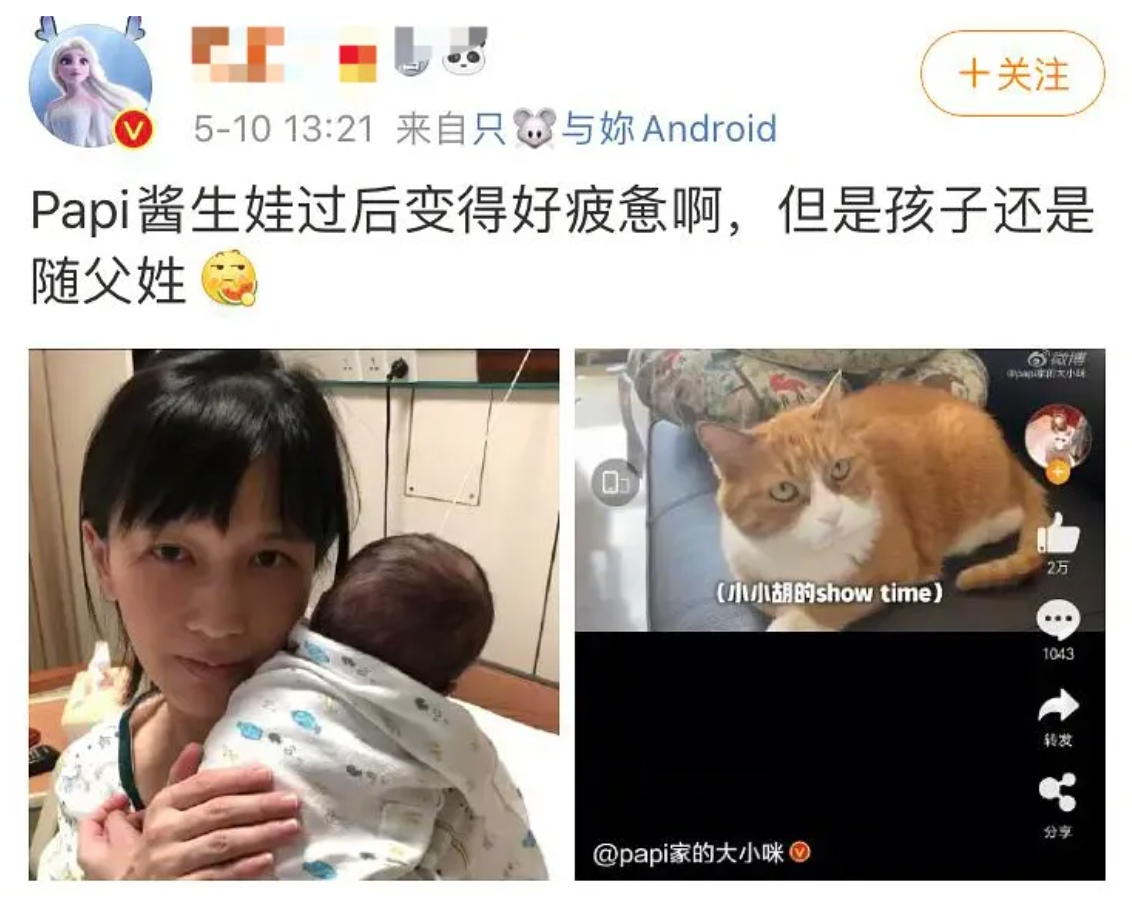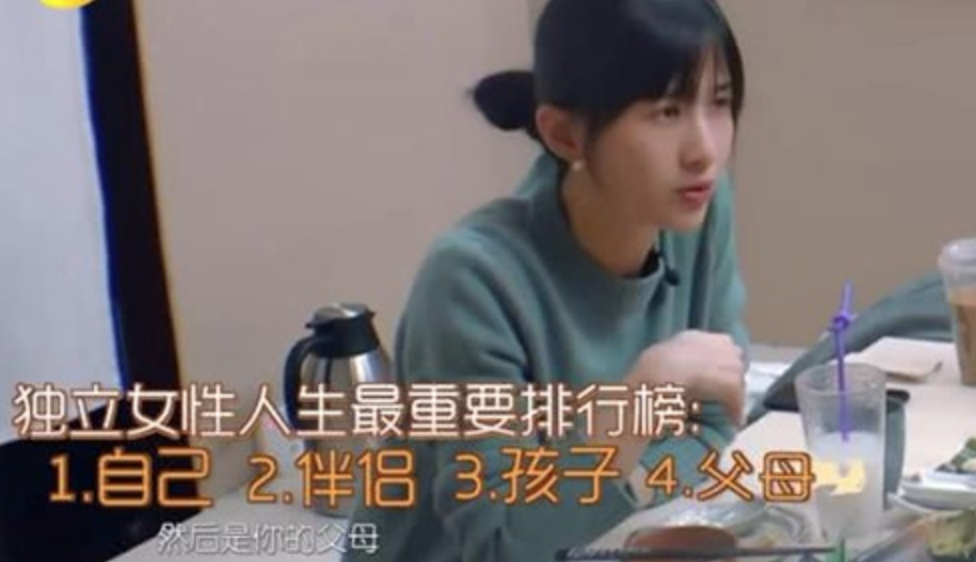Papi Jiang, China’s internet queen, sparks messy feminist debate
Papi Jiang, China's internet queen, sparks messy feminist debate

Can you be a feminist and let your kids inherit your husband’s family name rather than yours?
This is a contentious question that has become a hot topic of debate on the Chinese internet over the past few days, and at the center of it is Jiāng Yìlěi 姜逸磊, one of China’s megawatt internet celebrities known as Papi Jiang.
It all started when Jiang shared a photo of herself and her newborn daughter on this year’s Mother’s Day, May 10. The innocuous post somehow touched a nerve with some women who took issue with the baby adopting her father’s last name, and the situation only snowballed from there.
For those unfamiliar with the general discourse surrounding the feminist movement in China, each new development emerging out of this controversy has only made it more difficult to follow: Why did Jiang suffer special scrutiny for a fairly common practice? Is she a feminist? And how does the debate fit into the broader conversation of gender equality in China?
Below we’ve done our best to answer the most pressing questions regarding the drama.
Why are people slamming her for her child’s name?
It began with a Weibo post over the weekend in which Jiang shared a photo of herself in a hospital bed with her newborn baby. In the caption, Jiang shared her thoughts on motherhood and paid tribute to all the women who had experienced the agonizing pain of labor. “I recently came to realize that being a mother is the most tiring thing in this world,” she wrote.
It’s a simple photo, and the message didn’t have anything remotely offensive. But when Weibo user @恩和-I pointed out that Jiang named her baby after her husband, implying that the decision was unfair considering what Jiang had been through as a new mother, others became outraged. “Papi Jiang looks so weak after childbirth, but the kid still adopted her father’s family name,” the person wrote in a since-deleted post.
While @恩和-I is not an influential figure by any stretch, her comment struck a chord with a number of people who thought Jiang’s choice was an affront to their feminist values. Some of them even went further, calling Jiang a “married donkey” (婚驴 hūnlǘ), a derogatory Chinese term used to describe women who conform to patriarchal rules and become “properties” of their husbands’ families after marriage.
“I feel so sorry for her. She used to be an independent woman who I admired a lot, but she has become a ‘married donkey’ now,” a critic wrote (in Chinese). To which another Weibo user replied, “You don’t need to feel sorry for her. She made the choice and she will suffer the consequences.”
Are there people coming to Jiang’s defense?
Yes, plenty. And they are dominating the discourse now with the help of a few high-profile news publishers and gender experts.
In an opinion piece (in Chinese) published by the Beijing News, the author argued that the vitriol Jiang has received was mostly from what he called “feminist warriors,” who have a tendency to impose their “extreme views” about gender equality on others. “I’m by no means an expert on gender issues, but based on what I’ve read on this topic, I don’t think any feminist theories support such vicious attacks on married women,” the author wrote. “This is not feminism. This is another form of women-shaming.”
Lǐ Yínhé 李银河, a leading sociologist and sexologist who has written extensively on women’s issues, penned an article (in Chinese) in light of the controversy in Global Times. Li asked people who showed their distaste in Jiang’s decision to “respect her personal choice” while acknowledging that the debate was an indication of a growing awareness of gender issues within the mainstream. She also suggested feminists shift their attention away from minor issues to “more important” topics, such as a fair split of decision-making power in marriage and gender equality in a broad sense.
While most of the messages in support of Jiang were rational and reasonable, the backlash to what many people disparagingly labeled “extreme feminist views” also amplified some misogynist voices. “If my future wife wants our kid to bear her last name, I will kick them out,” a man wrote (in Chinese) on Hupu, a Chinese sports forum whose users are mostly male.
How uncommon is it for Chinese women to pass their family names on to their children?
While Chinese law doesn’t forbid children from inheriting their mothers’ last names, Chinese couples in heterosexual relationships, like those in most other countries in the world, are expected to hand down the fathers’ surnames.
A growing number of couples have attempted workarounds: According to a 2019 study, the last names of more than 1.1 million Chinese people are a combination of their father’s and mother’s surnames, a tenfold increase from 1990. But it’s still deemed extremely radical to give a child a woman’s surname.
According to gender expert Yu Ning, the fact that the common practice of passing down male surnames went unchallenged for thousands of years has to do with power dynamics in families. “Typically, if a child has his mother’s surname, it means that the woman comes from a much richer or more powerful family than her husband,” she explained in a Sixth Tone piece. “In order to avoid giving the impression of being inferior to their wives, comparatively few Chinese men are willing to give their children their wives’ family names.”
Why is Jiang being scrutinized for a common practice? Is it because she is a feminist?
With more than 33 million followers on Weibo, Jiang is one of the most successful and popular internet celebrities in China. In 2015, as a recent graduate of the prestigious Central Academy of Drama in Beijing, Jiang became an online sensation by posting videos of her doing monologues in her bedroom. Since then, a string of companies have paid millions of dollars to partner with her. In 2016, she founded her own media company, Papitube, managing a team of content creators who produce videos for her.
Although Jiang never publicly embraced feminism, many people believed that she secretly held feminist opinions based on what she’s said over the years. As a comedian, her catchphrase is: “I’m Papi Jiang, a woman possessing both beauty and talent.” In her videos, she often wears minimal makeup and casual clothing, which is rare for Chinese female celebrities. In the early days of her career, she created a few videos where she proudly called herself a “leftover woman,” saying that being single while approaching 30 was not something she felt ashamed of. Last year, after she married, she said in a talk show that she hadn’t met her in-laws and would always prioritize self-growth over everything else as an “independent woman.”
Why were people so ready to weigh in on this topic?
The Papi Jiang drama comes on the heels of a different controversy about the same issue a few weeks ago, in which a Chinese woman set off a firestorm on social media after revealing that she was planning to divorce her husband because he refused to give their son the wife’s name. In the woman’s post, she explicitly said that despite the opposition from her parents and in-laws, she believed that her unconventional choice was vital to her pursuit of gender equality in marriage.
What does Jiang have to say about all this?
So far, Jiang hasn’t publicly responded to the issue, but she subtly clapped back this week by making an old video of her parodying trolls as her pinned post (in Chinese) on Weibo. “There are so many trolls on the internet and in real life. They can find things to critique whatever you say. They can find fault with whatever you do. I don’t know if it’s because they have so many pet peeves or because nitpicking can make them feel a sense of superiority,” the video’s description reads.








